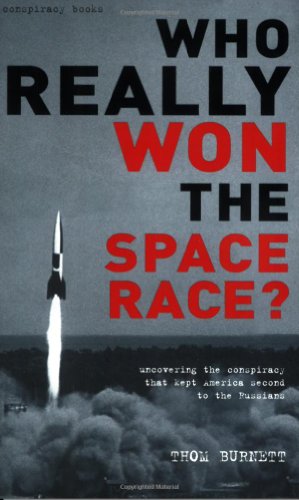- Date: 15.01.2010
- Book: Who Really Won the Space Race? (Conspiracy Books)
- Author: plappen
Review
Who Really Won the Space Race?, Thom Burnett, 2005, ISBN 1843402904 Reviewed by Paul LappenThis book looks at the history of the "Space Race" between America and the Soviet Union, and asserts that America could have put a satellite into orbit a year before the Russians.
At the end of World War II, America and the Soviets were racing around Germany, gathering up as many German V-2 rocket parts, engineering drawings and scientists as they could find. This was to be done before the zones of control in Germany, agreed at Yalta, came into effect. The German scientists were more interested in rockets and space flight than in rockets and war. Most of the Germans surrendered to the Americans, while some surrendered to the Russians.
After much interrogation and debriefing in Europe, the "American Germans" were quietly brought to America, and ended up at Fort Bliss, near El Paso, Texas. They were intentionally kept away from any classified information, for obvious reasons, and there was little or nothing for them to do. The "Russian Germans" were not faring much better. They, and their families, were forcibly deported to Russia, and ended up on a desolate island over 100 miles from Moscow. They had to be segregated from the local population; as in America, memories fade slowly. For the next 5 years, they did their best, under terrible working conditions, until being deported to the West. There is little indication that the Russians ever used German expertise on their rockets.
Back in America, the Germans were eventually moved to Huntsville, Alabama. It was much more hospitable than Texas, both technically and for their families. They were made American citizens in 1955, so they could access Top Secret information. Throughout the 1950s, there were a number of government commissions tasked with deciding what to do about rockets, specifically the ex-Nazis in their employ. The Stewart Committee had to decide what booster system would be used to get a satellite into orbit, the proven German system, or an American system that needed more work. When Wernher von Braun, the leader of the Germans, learned that the American system was chosen, he went ballistic. Among the official reasons for the decision was to keep the military program (on which the Germans were working) and the civilian programs separate. Among the actual reasons was plain old racism. It would not be good for Americas rocket to be called the "Nazi Rocket."
This book does a wonderful job as a history of the Space Race from the end of World War II to the first American satellite. I am not so sure of this as a conspiracy book (the "conspiracy" part is only in the last chapter), but it is still well worth reading.
Recent actions
-
toryah1988 has added Harry Potter And The Order Of The Phoenix to their read list.
-
toryah1988 has added Harry Potter And The Goblet Of Fire to their read list.
-
toryah1988 has added Atonement to their read list.
-
toryah1988 has added New Moon (The Twilight Saga) to their read list.
-
Monica has added The Da Vinci Code (Large Print) to their wish list.
